


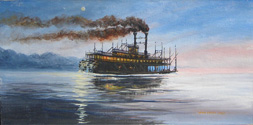
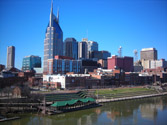
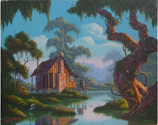
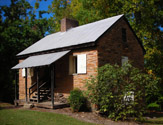









Cotton States Archive
The Winecoff Hotel
An Atlanta Irony
An Atlanta Irony
More than half a century ago, the worst hotel fire in American history took place at downtown Atlanta's Hotel Winecoff . . . the brick and stone structure owner William Fleming Winecoff had touted as fireproof! The tragedy occured in the pre-dawn hours on December 7, 1946. Claiming the lives of 119, including 30 high school students who were in town for a meeting, a number of hotel guests leapt to their deaths to escape the smoke and flames.
The fifteen story Winecoff, located at 178 Peachtree Street, opened for business in 1913 as the city's tallest building. Possessing neither fire escapes nor sprinklers, the W. L. Stoddart-designed building was further doomed on the morning of the fire by the fact that firefighters could only reach as high as the eighth floor by ladder. Though the cause of the fire has been the subject of much debate through the years, authors Sam Heys and Allen Goodwin assert in their book, The Winecoff Fire: The Untold Story of America's Deadliest Hotel Fire, that a man, seeking revenge on a poker player, intentionally set the fire. Interestingly, Mr. and Mrs. Winecoff also perished in the fire.
The fifteen story Winecoff, located at 178 Peachtree Street, opened for business in 1913 as the city's tallest building. Possessing neither fire escapes nor sprinklers, the W. L. Stoddart-designed building was further doomed on the morning of the fire by the fact that firefighters could only reach as high as the eighth floor by ladder. Though the cause of the fire has been the subject of much debate through the years, authors Sam Heys and Allen Goodwin assert in their book, The Winecoff Fire: The Untold Story of America's Deadliest Hotel Fire, that a man, seeking revenge on a poker player, intentionally set the fire. Interestingly, Mr. and Mrs. Winecoff also perished in the fire.
Lee Roy Abernathy (1913-1993), an eventual Georgia gubernatorial candidate and composer of such famous southern gospel songs as "I Thank My Savior for It All," "Take A Moment and Live" and "Everybody's Gonna Have A Wonderful Time Up There," had a permanent room at the Winecoff and would have stayed there on the weekend of the fire due to World War II fuel shortages. However, a friend gave him a coupon for a few gallons of gas, allowing him to return home to North Georgia for the weekend. Three gallons of gas probably saved Abernathy's life!
Abernathy would later write the eyebrow-raising song, "The Burning of the Winecoff," and earn criticism from some who felt he was capitalizing on the deadly fire. Nonetheless, the song brought much attention to the event and garnered Abernathy a National Fire Protection award.
Country music legend Hank Williams also sang of the Winecoff in a gospel song penned by Milton Estes, Tommy Harrell, Paul Kinsey and southern gospel pioneer Wally Fowler. Originally performing the song on The Mother's Best Flour Show on Nashville's WSM radio in 1951, the radio recording of "When the Fire Comes Down" was released on a much anticipated CD in 2008.
Another tool used to roil the public over fire prevention and safety was an image of a woman leaping in desperation from her eleventh-floor hotel room window at the Winecoff. Captured by amateur photographer Arnold Hardy, the picture was sold to the Associated Press, wound up being published in newspapers and on magazine covers and became the first amateur photograph to win a Pulitzer Prize. More importantly, the picture prompted a change in fire codes nationally.
Since that horrendous event, the Winecoff has undergone a number of ownership changes. It reopened as the Peachtree on Peachtree Hotel in 1951, but owner Fred Beazley donated the building in 1967 to the Georgia Baptist Convention which used the facility as a retirement home. For the last 20+ years, renovating the property as a hotel or converting it into loft apartments has been the ambition of one developer or another, but nothing came to fruition until the summer of 2007 when the building was re-opened as the boutique-style Ellis Hotel.
Situated in the heart of downtown Atlanta across the street from the posh Ritz-Carlton Atlanta Hotel, the old Winecoff---once Atlanta's tallest building---is now dwarfed by nearby skyscrapers including the fifty floor 191 Peachtree Tower, the fifty-two story Georgia Pacific Tower and the dramatic John Portman-designed Westin Peachtree Plaza Hotel (which was the world's tallest hotel upon its completion in 1976 at seventy-three floors and over seven hundred feet in height).
Though the Winecoff building is no longer one of the city's tallest, its presence in twenty-first century Atlanta is likely to be anything but diminutive. With the advent of the Ellis Hotel, the nostalgic can bask amid the architectural essence of a bygone era, and the jet-lagged conventioneer or leisure traveler can indulge in all the amenities that embody the elegance and hospitality of a great old southern hotel.
Abernathy would later write the eyebrow-raising song, "The Burning of the Winecoff," and earn criticism from some who felt he was capitalizing on the deadly fire. Nonetheless, the song brought much attention to the event and garnered Abernathy a National Fire Protection award.
Country music legend Hank Williams also sang of the Winecoff in a gospel song penned by Milton Estes, Tommy Harrell, Paul Kinsey and southern gospel pioneer Wally Fowler. Originally performing the song on The Mother's Best Flour Show on Nashville's WSM radio in 1951, the radio recording of "When the Fire Comes Down" was released on a much anticipated CD in 2008.
Another tool used to roil the public over fire prevention and safety was an image of a woman leaping in desperation from her eleventh-floor hotel room window at the Winecoff. Captured by amateur photographer Arnold Hardy, the picture was sold to the Associated Press, wound up being published in newspapers and on magazine covers and became the first amateur photograph to win a Pulitzer Prize. More importantly, the picture prompted a change in fire codes nationally.
Since that horrendous event, the Winecoff has undergone a number of ownership changes. It reopened as the Peachtree on Peachtree Hotel in 1951, but owner Fred Beazley donated the building in 1967 to the Georgia Baptist Convention which used the facility as a retirement home. For the last 20+ years, renovating the property as a hotel or converting it into loft apartments has been the ambition of one developer or another, but nothing came to fruition until the summer of 2007 when the building was re-opened as the boutique-style Ellis Hotel.
Situated in the heart of downtown Atlanta across the street from the posh Ritz-Carlton Atlanta Hotel, the old Winecoff---once Atlanta's tallest building---is now dwarfed by nearby skyscrapers including the fifty floor 191 Peachtree Tower, the fifty-two story Georgia Pacific Tower and the dramatic John Portman-designed Westin Peachtree Plaza Hotel (which was the world's tallest hotel upon its completion in 1976 at seventy-three floors and over seven hundred feet in height).
Though the Winecoff building is no longer one of the city's tallest, its presence in twenty-first century Atlanta is likely to be anything but diminutive. With the advent of the Ellis Hotel, the nostalgic can bask amid the architectural essence of a bygone era, and the jet-lagged conventioneer or leisure traveler can indulge in all the amenities that embody the elegance and hospitality of a great old southern hotel.
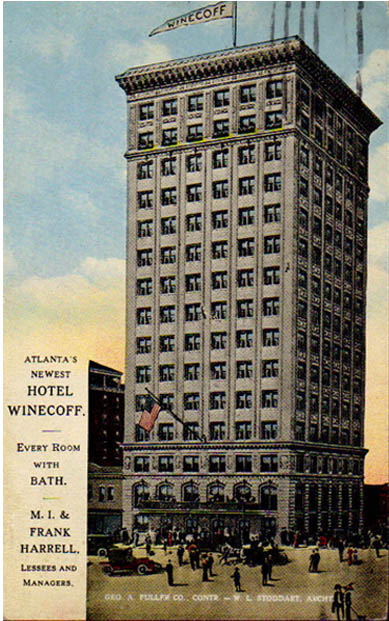
This post card, the property of Southern Edition editor Greg Freeman, may have set some sort of record on eBay. With emotions running high, an intense round of bidding ensued. Freeman bowed out after the card reached $30 or $35. Meanwhile, his friend picked up where he left off and acquired the card for $66.00! It was presented to Freeman as a birthday gift in 2006!
Hotel Winecoff was designed by architect W. L. Stoddart who was also responsible for Birmingham's famous Tutwiler Hotel. See Dinkler Hotels article).
Hotel Winecoff was designed by architect W. L. Stoddart who was also responsible for Birmingham's famous Tutwiler Hotel. See Dinkler Hotels article).
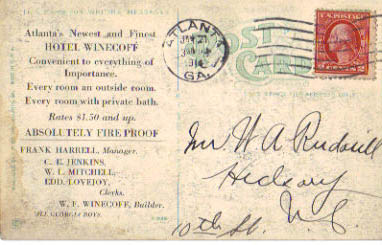
Postmarked January 21, 1914, this post card was mailed three months after the Winecoff Hotel's official opening on October 13, 1913. Billed as "Atlanta's Newest and Finest" and "Convenient to everything of Importance," the Winecoff is advertised here in bold, capital letters as "ABSOLUTELY FIREPROOF." The Winecoff tragedy is reminiscent of the sinking of the Titanic---the "unsinkable" passenger liner that failed to complete its maiden voyage.
Though not clearly legible in this scan, it is interesting that emphasis was placed on letting the world know that hotel manager Frank Harrell, clerks C. E. Jenkins, W. L. Mitchell & Edd. Lovejoy, and builder W. F. Winecoff were "ALL GEORGIA BOYS."
Though not clearly legible in this scan, it is interesting that emphasis was placed on letting the world know that hotel manager Frank Harrell, clerks C. E. Jenkins, W. L. Mitchell & Edd. Lovejoy, and builder W. F. Winecoff were "ALL GEORGIA BOYS."
BIBLIOGRAPHY
Sam Heys and Allen Goodwin, The Winecoff Fire: The Untold Story of America's Deadliest Hotel Fire (Atlanta: Longstreet Press, 1993).
Zell Miller, They Heard Georgia Singing (Macon, Georgia: Mercer University Press, 1996).
David Pendered, "Tattered Winecoff may have rebirth," Atlanta Journal-Constitution, June 16, 2003.
David Pendered, "Would-be developer of Winecoff sues," Atlanta Journal-Constitution, January 31, 2005.
Leon Stafford, "Boutique hotels enjoy new boom," Atlanta Journal-Constitution, April 30, 2006.
Sam Heys and Allen Goodwin, The Winecoff Fire: The Untold Story of America's Deadliest Hotel Fire (Atlanta: Longstreet Press, 1993).
Zell Miller, They Heard Georgia Singing (Macon, Georgia: Mercer University Press, 1996).
David Pendered, "Tattered Winecoff may have rebirth," Atlanta Journal-Constitution, June 16, 2003.
David Pendered, "Would-be developer of Winecoff sues," Atlanta Journal-Constitution, January 31, 2005.
Leon Stafford, "Boutique hotels enjoy new boom," Atlanta Journal-Constitution, April 30, 2006.
Author: Greg Freeman. Published December 11, 2006. Amended August 23, 2011.
Copyright
Southern Edition
All Rights Reserved
Southern Edition
All Rights Reserved
All materials contained on this site, including text and images, are protected by copyright laws and may not be reproduced without prior written permission from the publisher. Where applicable, use of some items contained on this site may require permission from other copyright owners.
Fair Use of text from SouthernEdition.com is permitted to the extent allowed by copyright law. Proper citation is requested. Please use this guide when citing a Southern Edition article.
Contact Greg Freeman or SouthernEdition.comFair Use of text from SouthernEdition.com is permitted to the extent allowed by copyright law. Proper citation is requested. Please use this guide when citing a Southern Edition article.